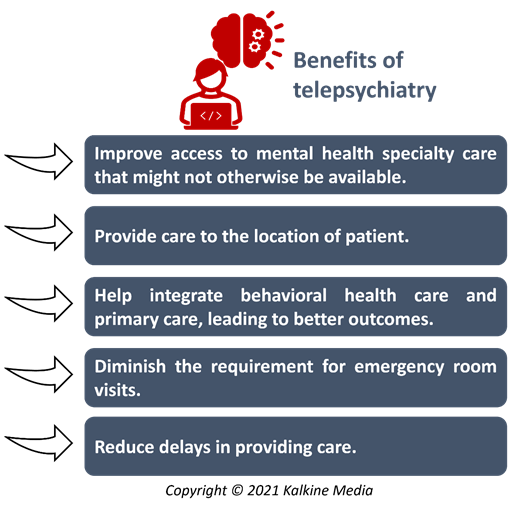Highlights
- During COVID-19 the telemental health is grabbing the attention as it provides access to mental health services to the rural and remote areas.
- Telepsychiatry is the remote delivery of psychiatric care and provides a platform to facilitate mental health care in rural and remote areas.
- With more significant opportunities to connect with patients, telepsychiatry should comprise a balanced hybrid model as standard care.
The ongoing COVID-19 pandemic has questioned the conventional manner of providing psychiatric evaluation and treatment involving face-to-face interaction. Telepsychiatry is the remote delivery of psychiatric care and provides a platform to facilitate mental health care in rural and remote areas. Notably, the recent advancements in information technology (IT) and access to a smartphone have increased the scope of healthcare delivery services worldwide. Therefore, amid the COVID-19 pandemic, telepsychiatry has witnessed an acceleration in demand for providing telemental health.
How telepsychiatry is gaining importance amid COVID-19 pandemic?
Telepsychiatry is an already existing but under-utilised tool that can assist in reducing the interruption to patient care. Nowadays, technological advancement is at a point where it can accelerate comprehensive use of this practice. Additionally, in hybrid telepsychiatry models, public mental health workers provides home-based telepsychiatry services including home visits.
RELATED ARTICLE: Virtual care is booming amid pandemic: A glance at the pros and cons of telehealth

Source: © Ivelinr | Megapixl.com
Telepsychiatry can connect patients to psychiatrists at different locations and also links primary service providers in remote areas to networks of mental health specialists. These days mental health professionals are using Zoom, WhatsApp, Skype, Facebook, and some other popular, easily available platforms to offer online psychiatric services rather than developing a secured mobile phone app with the help of IT professionals and digital health experts.
RELATED READ: Virtual Care Technology Amidst Global Virus Crisis: Emerging Trends
What are the benefits of telepsychiatry?
Telepsychiatry provides patients affordable, convenient, as well as easily available mental health services. It can benefit patients in several ways, and one of them is patients can schedule individual appointments with a psychiatrist for a video session.

DO WATCH: How is predictive analysis shaping the healthcare sector?
What is hybrid telepsychiatry?
Telepsychiatry provides a platform for mental health care services in remote and rural areas. In telepsychiatry, there is a model called hybrid telepsychiatry that combines home-based telepsychiatry with home visits by public mental health service providers.
The hybrid telepsychiatry includes use of different types of tele devices to ensure a safe and secure clinical platform. Furthermore, the research evidence supports that incorporating the hybrid model to efficiently use the specialist time where there are limited resources and facilities need to be catered for the greater geographical community.

In telepsychiatry, psychiatrists can provide remote therapy online (Image Source: © Verbaska | Megapixl.com)
How does the future of telepsychiatry look?
According to some specialists, the available literature indicates increased patient satisfaction levels, most likely because of the flexibility of telepsychiatry. Besides, it becomes simpler for patients to turn up for appointments with slight disruptions to their schedule.
Telepsychiatry helps clinicians to schedule appointments over their travel programs and leisure time. Other advantage of using telepsychiatry is that patients may find the telepsychiatry easier and comfortable way of discussing the sensitive information.
With the significant number of opportunities for connecting patients with their clinicians and increased levels of patient satisfaction, the future of telepsychiatry should comprise a balanced hybrid model as standard care.
Telepsychiatry should make an enormous difference to people who cannot travel for several reasons, including physical disability, daily wage earner and old age. Besides, patients having apparent stigma may feel comfortable sharing their problems and taking advice by using telepsychiatry.
Bottom Line
Overall, as the uncertainty of the COVID-19 continues, telepsychiatry will remain one of the major platforms to provide mental health services in a safe and cost-effective manner. While the use of telepsychiatry bridges the gap between service providers, patients, and their families, service providers or clinicians must consider how to address licensure, liability, reimbursement and technologic accessibility to use telepsychiatry services during these challenging times.
ALSO READ: COVID-19 in Australia: No letup in sight despite continuous lockdowns



